Leadership and Management in Service Industries - Avco Systems
VerifiedAdded on 2022/11/29
|13
|4135
|319
Report
AI Summary
This report delves into the crucial roles of leadership and management in the competitive service industry, using Avco Systems as a case study. It begins by exploring classical management theories and their application, alongside the duties of a leader and various leadership styles like autocratic and democratic approaches. The report then analyzes internal and external factors influencing management styles and organizational structure, such as employee strengths, business types, political, economic, social, and technological factors. It further examines current and future management and leadership skills, encompassing both hard skills (technical, analytical) and soft skills (communication, ethics). Finally, the report discusses change management systems and leadership's role in implementing change within the service sector, providing a comprehensive overview of effective management and leadership strategies.
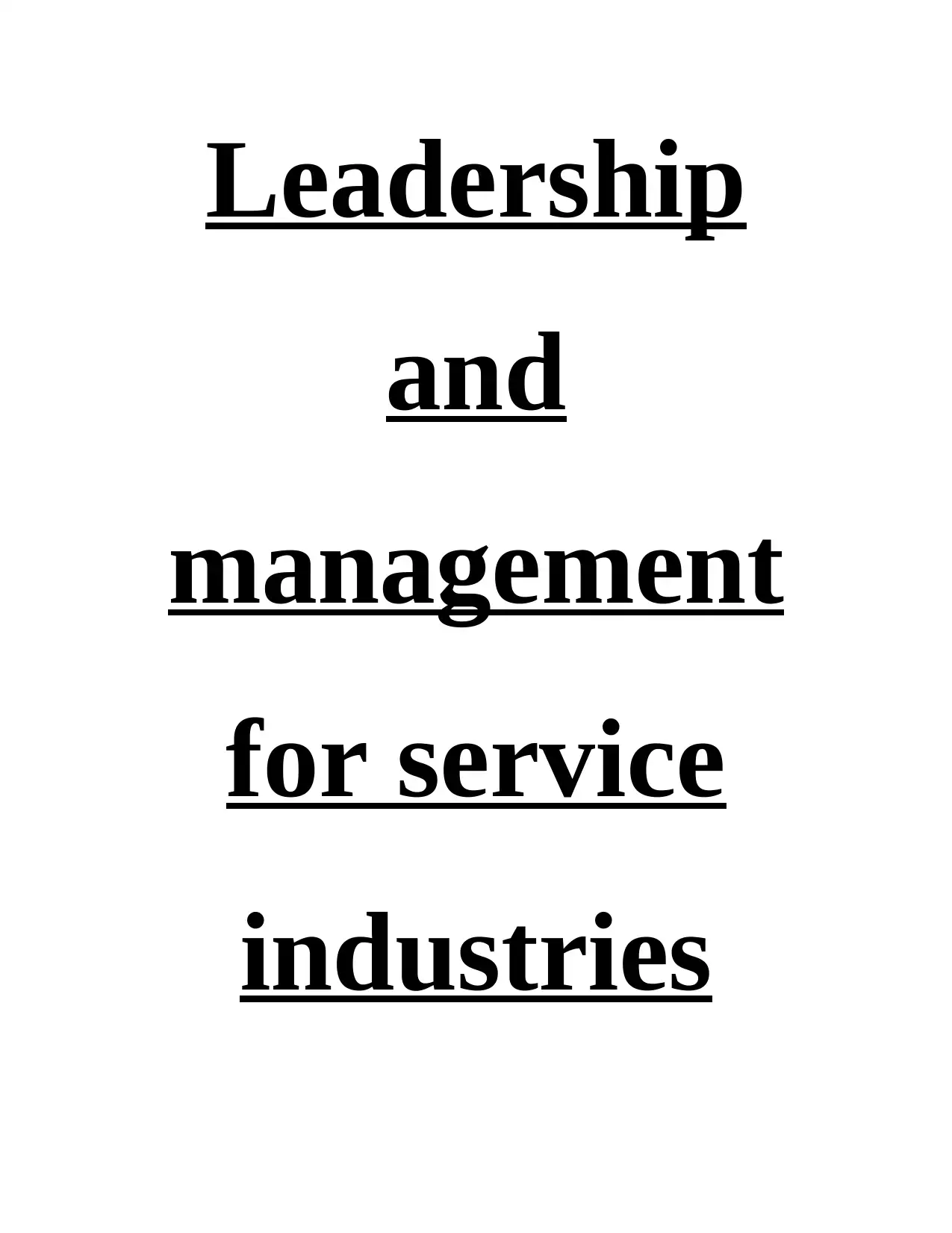
Leadership
and
management
for service
industries
and
management
for service
industries
Paraphrase This Document
Need a fresh take? Get an instant paraphrase of this document with our AI Paraphraser
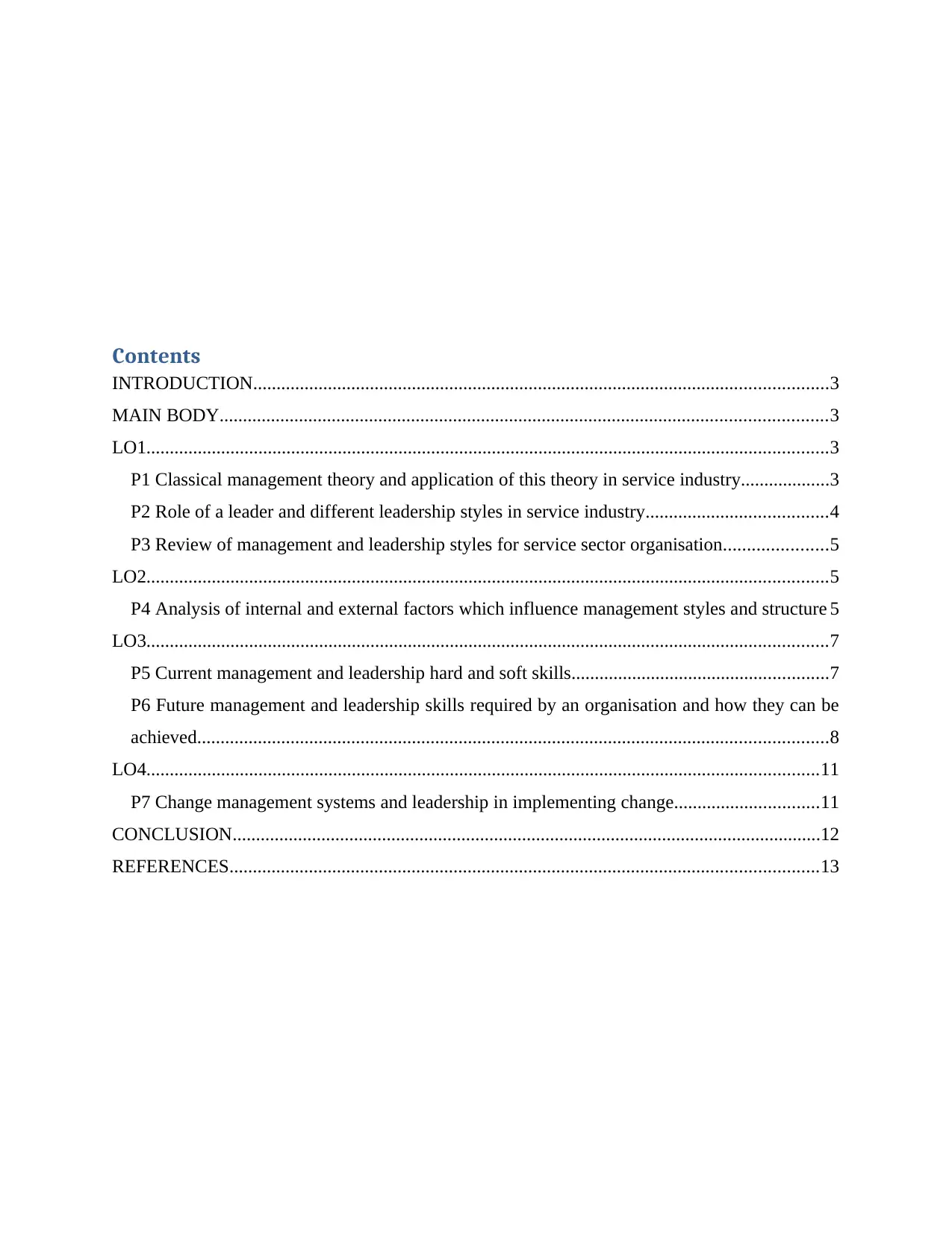
Contents
INTRODUCTION...........................................................................................................................3
MAIN BODY..................................................................................................................................3
LO1..................................................................................................................................................3
P1 Classical management theory and application of this theory in service industry...................3
P2 Role of a leader and different leadership styles in service industry.......................................4
P3 Review of management and leadership styles for service sector organisation......................5
LO2..................................................................................................................................................5
P4 Analysis of internal and external factors which influence management styles and structure 5
LO3..................................................................................................................................................7
P5 Current management and leadership hard and soft skills.......................................................7
P6 Future management and leadership skills required by an organisation and how they can be
achieved.......................................................................................................................................8
LO4................................................................................................................................................11
P7 Change management systems and leadership in implementing change...............................11
CONCLUSION..............................................................................................................................12
REFERENCES..............................................................................................................................13
INTRODUCTION...........................................................................................................................3
MAIN BODY..................................................................................................................................3
LO1..................................................................................................................................................3
P1 Classical management theory and application of this theory in service industry...................3
P2 Role of a leader and different leadership styles in service industry.......................................4
P3 Review of management and leadership styles for service sector organisation......................5
LO2..................................................................................................................................................5
P4 Analysis of internal and external factors which influence management styles and structure 5
LO3..................................................................................................................................................7
P5 Current management and leadership hard and soft skills.......................................................7
P6 Future management and leadership skills required by an organisation and how they can be
achieved.......................................................................................................................................8
LO4................................................................................................................................................11
P7 Change management systems and leadership in implementing change...............................11
CONCLUSION..............................................................................................................................12
REFERENCES..............................................................................................................................13
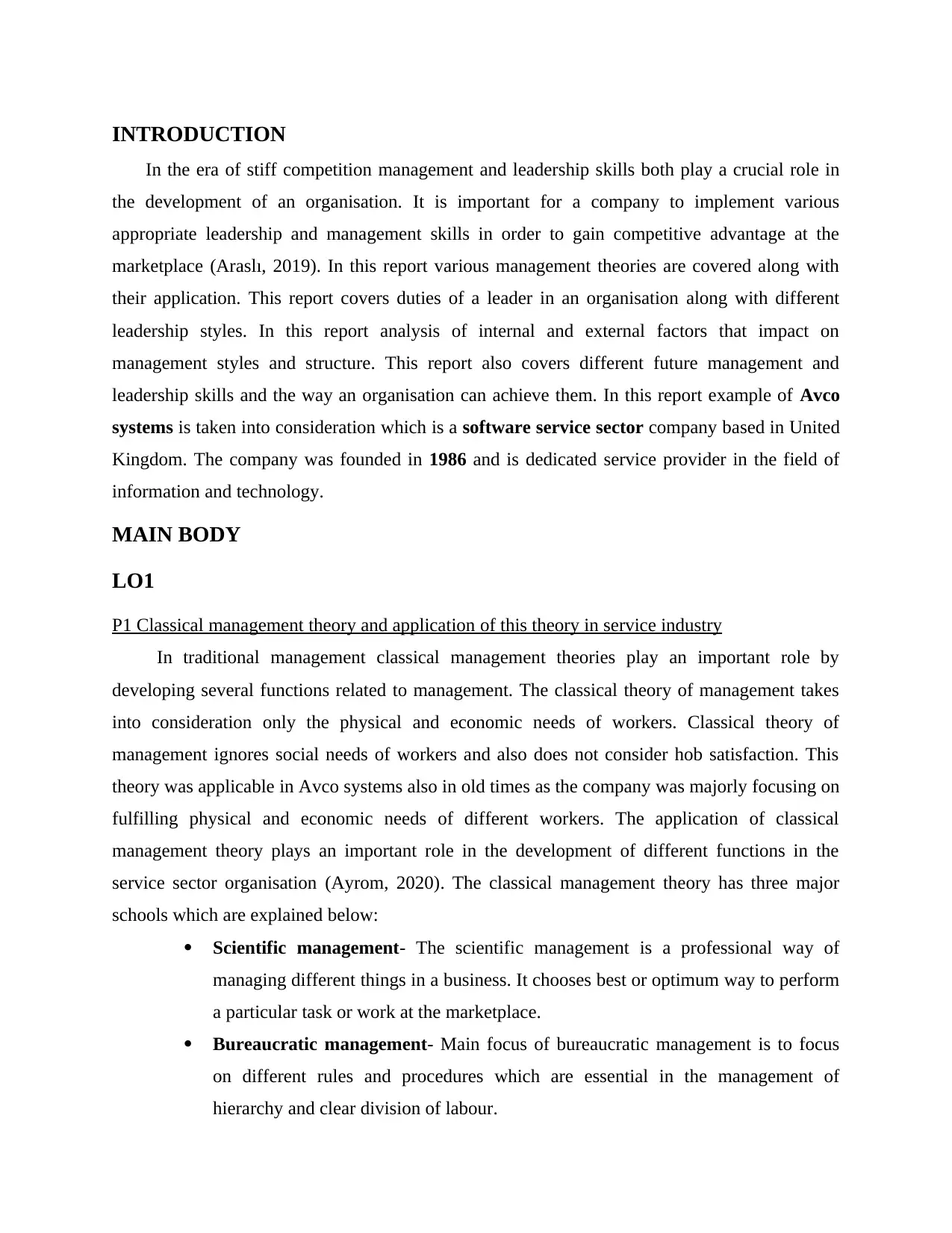
INTRODUCTION
In the era of stiff competition management and leadership skills both play a crucial role in
the development of an organisation. It is important for a company to implement various
appropriate leadership and management skills in order to gain competitive advantage at the
marketplace (Araslı, 2019). In this report various management theories are covered along with
their application. This report covers duties of a leader in an organisation along with different
leadership styles. In this report analysis of internal and external factors that impact on
management styles and structure. This report also covers different future management and
leadership skills and the way an organisation can achieve them. In this report example of Avco
systems is taken into consideration which is a software service sector company based in United
Kingdom. The company was founded in 1986 and is dedicated service provider in the field of
information and technology.
MAIN BODY
LO1
P1 Classical management theory and application of this theory in service industry
In traditional management classical management theories play an important role by
developing several functions related to management. The classical theory of management takes
into consideration only the physical and economic needs of workers. Classical theory of
management ignores social needs of workers and also does not consider hob satisfaction. This
theory was applicable in Avco systems also in old times as the company was majorly focusing on
fulfilling physical and economic needs of different workers. The application of classical
management theory plays an important role in the development of different functions in the
service sector organisation (Ayrom, 2020). The classical management theory has three major
schools which are explained below:
Scientific management- The scientific management is a professional way of
managing different things in a business. It chooses best or optimum way to perform
a particular task or work at the marketplace.
Bureaucratic management- Main focus of bureaucratic management is to focus
on different rules and procedures which are essential in the management of
hierarchy and clear division of labour.
In the era of stiff competition management and leadership skills both play a crucial role in
the development of an organisation. It is important for a company to implement various
appropriate leadership and management skills in order to gain competitive advantage at the
marketplace (Araslı, 2019). In this report various management theories are covered along with
their application. This report covers duties of a leader in an organisation along with different
leadership styles. In this report analysis of internal and external factors that impact on
management styles and structure. This report also covers different future management and
leadership skills and the way an organisation can achieve them. In this report example of Avco
systems is taken into consideration which is a software service sector company based in United
Kingdom. The company was founded in 1986 and is dedicated service provider in the field of
information and technology.
MAIN BODY
LO1
P1 Classical management theory and application of this theory in service industry
In traditional management classical management theories play an important role by
developing several functions related to management. The classical theory of management takes
into consideration only the physical and economic needs of workers. Classical theory of
management ignores social needs of workers and also does not consider hob satisfaction. This
theory was applicable in Avco systems also in old times as the company was majorly focusing on
fulfilling physical and economic needs of different workers. The application of classical
management theory plays an important role in the development of different functions in the
service sector organisation (Ayrom, 2020). The classical management theory has three major
schools which are explained below:
Scientific management- The scientific management is a professional way of
managing different things in a business. It chooses best or optimum way to perform
a particular task or work at the marketplace.
Bureaucratic management- Main focus of bureaucratic management is to focus
on different rules and procedures which are essential in the management of
hierarchy and clear division of labour.
⊘ This is a preview!⊘
Do you want full access?
Subscribe today to unlock all pages.

Trusted by 1+ million students worldwide
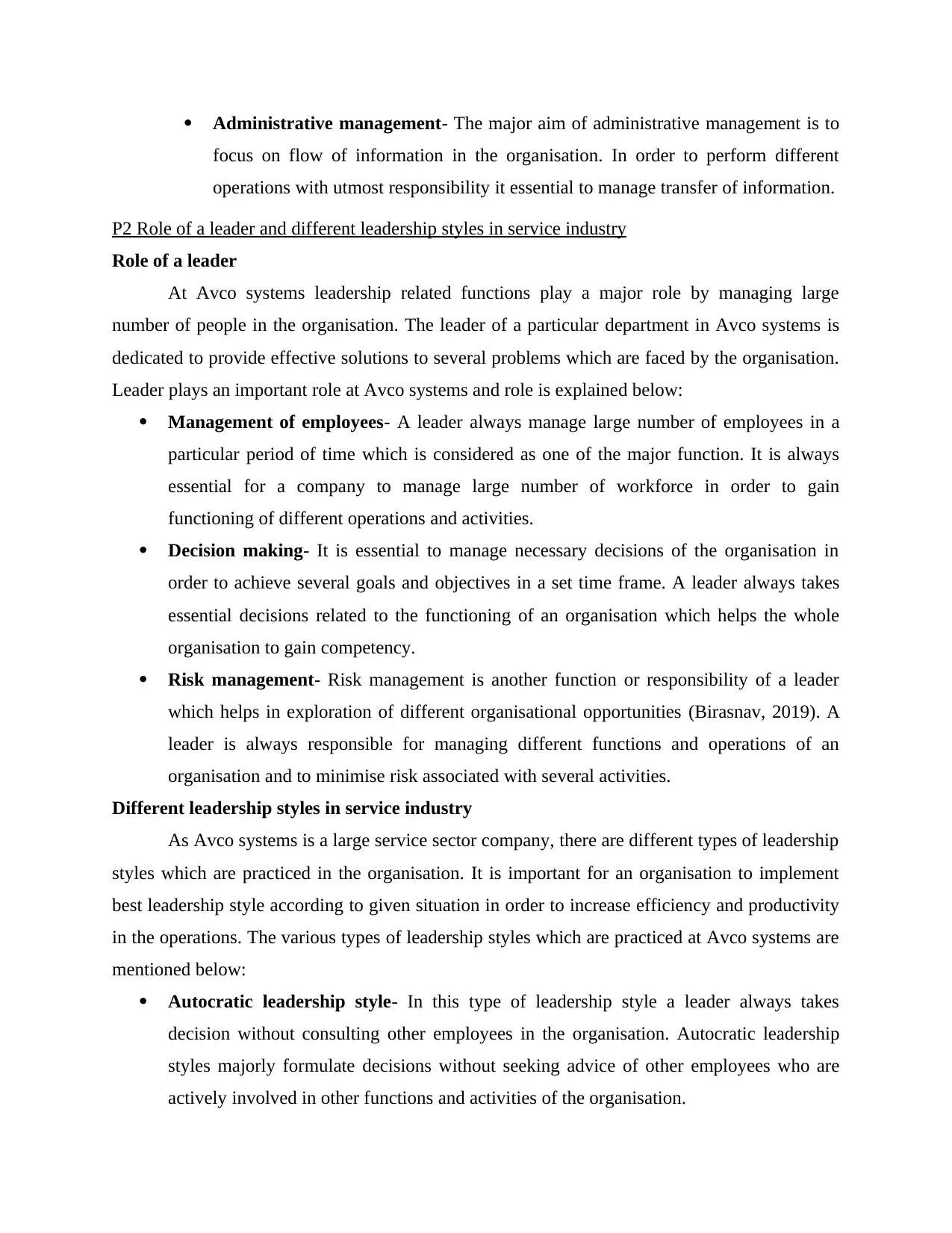
Administrative management- The major aim of administrative management is to
focus on flow of information in the organisation. In order to perform different
operations with utmost responsibility it essential to manage transfer of information.
P2 Role of a leader and different leadership styles in service industry
Role of a leader
At Avco systems leadership related functions play a major role by managing large
number of people in the organisation. The leader of a particular department in Avco systems is
dedicated to provide effective solutions to several problems which are faced by the organisation.
Leader plays an important role at Avco systems and role is explained below:
Management of employees- A leader always manage large number of employees in a
particular period of time which is considered as one of the major function. It is always
essential for a company to manage large number of workforce in order to gain
functioning of different operations and activities.
Decision making- It is essential to manage necessary decisions of the organisation in
order to achieve several goals and objectives in a set time frame. A leader always takes
essential decisions related to the functioning of an organisation which helps the whole
organisation to gain competency.
Risk management- Risk management is another function or responsibility of a leader
which helps in exploration of different organisational opportunities (Birasnav, 2019). A
leader is always responsible for managing different functions and operations of an
organisation and to minimise risk associated with several activities.
Different leadership styles in service industry
As Avco systems is a large service sector company, there are different types of leadership
styles which are practiced in the organisation. It is important for an organisation to implement
best leadership style according to given situation in order to increase efficiency and productivity
in the operations. The various types of leadership styles which are practiced at Avco systems are
mentioned below:
Autocratic leadership style- In this type of leadership style a leader always takes
decision without consulting other employees in the organisation. Autocratic leadership
styles majorly formulate decisions without seeking advice of other employees who are
actively involved in other functions and activities of the organisation.
focus on flow of information in the organisation. In order to perform different
operations with utmost responsibility it essential to manage transfer of information.
P2 Role of a leader and different leadership styles in service industry
Role of a leader
At Avco systems leadership related functions play a major role by managing large
number of people in the organisation. The leader of a particular department in Avco systems is
dedicated to provide effective solutions to several problems which are faced by the organisation.
Leader plays an important role at Avco systems and role is explained below:
Management of employees- A leader always manage large number of employees in a
particular period of time which is considered as one of the major function. It is always
essential for a company to manage large number of workforce in order to gain
functioning of different operations and activities.
Decision making- It is essential to manage necessary decisions of the organisation in
order to achieve several goals and objectives in a set time frame. A leader always takes
essential decisions related to the functioning of an organisation which helps the whole
organisation to gain competency.
Risk management- Risk management is another function or responsibility of a leader
which helps in exploration of different organisational opportunities (Birasnav, 2019). A
leader is always responsible for managing different functions and operations of an
organisation and to minimise risk associated with several activities.
Different leadership styles in service industry
As Avco systems is a large service sector company, there are different types of leadership
styles which are practiced in the organisation. It is important for an organisation to implement
best leadership style according to given situation in order to increase efficiency and productivity
in the operations. The various types of leadership styles which are practiced at Avco systems are
mentioned below:
Autocratic leadership style- In this type of leadership style a leader always takes
decision without consulting other employees in the organisation. Autocratic leadership
styles majorly formulate decisions without seeking advice of other employees who are
actively involved in other functions and activities of the organisation.
Paraphrase This Document
Need a fresh take? Get an instant paraphrase of this document with our AI Paraphraser
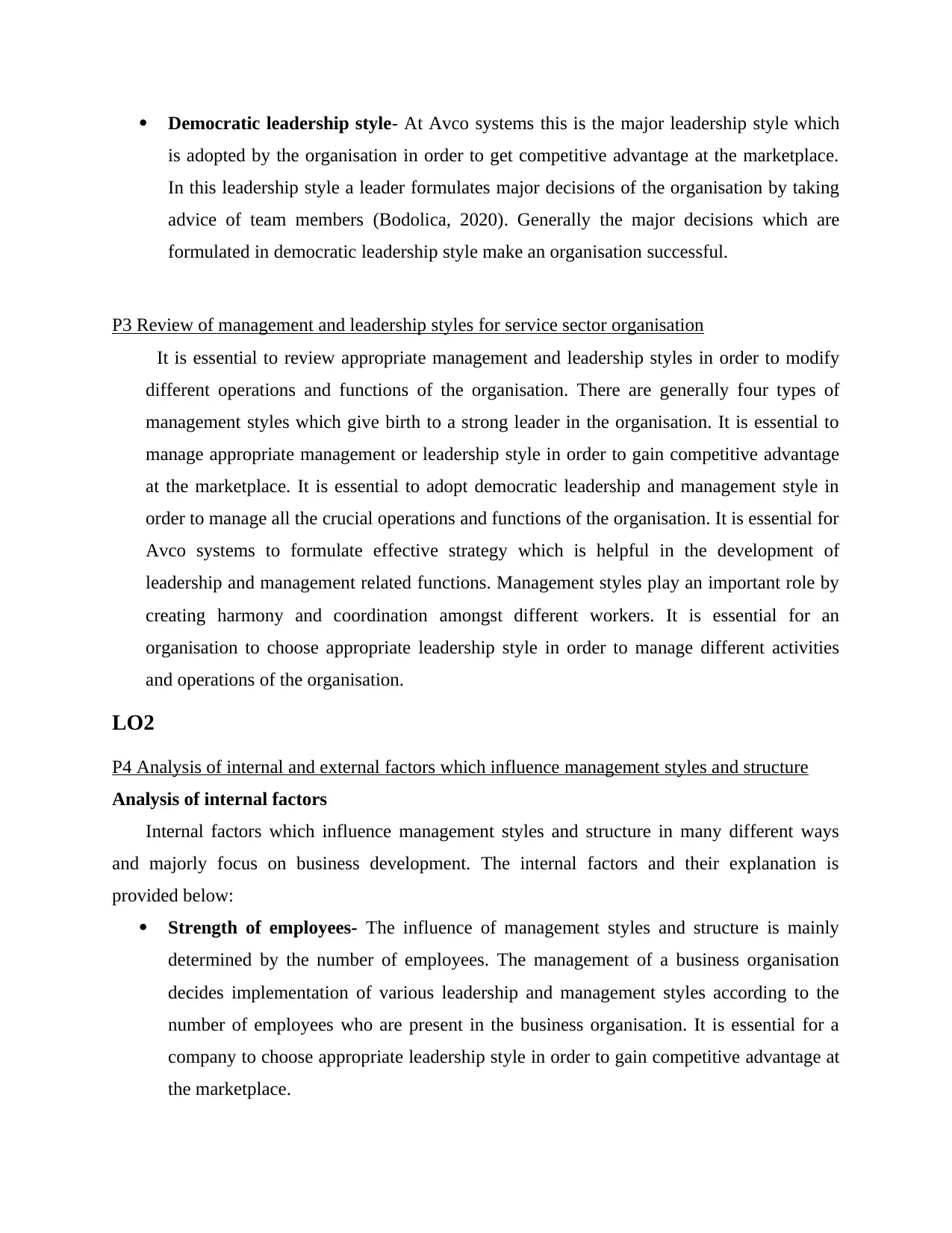
Democratic leadership style- At Avco systems this is the major leadership style which
is adopted by the organisation in order to get competitive advantage at the marketplace.
In this leadership style a leader formulates major decisions of the organisation by taking
advice of team members (Bodolica, 2020). Generally the major decisions which are
formulated in democratic leadership style make an organisation successful.
P3 Review of management and leadership styles for service sector organisation
It is essential to review appropriate management and leadership styles in order to modify
different operations and functions of the organisation. There are generally four types of
management styles which give birth to a strong leader in the organisation. It is essential to
manage appropriate management or leadership style in order to gain competitive advantage
at the marketplace. It is essential to adopt democratic leadership and management style in
order to manage all the crucial operations and functions of the organisation. It is essential for
Avco systems to formulate effective strategy which is helpful in the development of
leadership and management related functions. Management styles play an important role by
creating harmony and coordination amongst different workers. It is essential for an
organisation to choose appropriate leadership style in order to manage different activities
and operations of the organisation.
LO2
P4 Analysis of internal and external factors which influence management styles and structure
Analysis of internal factors
Internal factors which influence management styles and structure in many different ways
and majorly focus on business development. The internal factors and their explanation is
provided below:
Strength of employees- The influence of management styles and structure is mainly
determined by the number of employees. The management of a business organisation
decides implementation of various leadership and management styles according to the
number of employees who are present in the business organisation. It is essential for a
company to choose appropriate leadership style in order to gain competitive advantage at
the marketplace.
is adopted by the organisation in order to get competitive advantage at the marketplace.
In this leadership style a leader formulates major decisions of the organisation by taking
advice of team members (Bodolica, 2020). Generally the major decisions which are
formulated in democratic leadership style make an organisation successful.
P3 Review of management and leadership styles for service sector organisation
It is essential to review appropriate management and leadership styles in order to modify
different operations and functions of the organisation. There are generally four types of
management styles which give birth to a strong leader in the organisation. It is essential to
manage appropriate management or leadership style in order to gain competitive advantage
at the marketplace. It is essential to adopt democratic leadership and management style in
order to manage all the crucial operations and functions of the organisation. It is essential for
Avco systems to formulate effective strategy which is helpful in the development of
leadership and management related functions. Management styles play an important role by
creating harmony and coordination amongst different workers. It is essential for an
organisation to choose appropriate leadership style in order to manage different activities
and operations of the organisation.
LO2
P4 Analysis of internal and external factors which influence management styles and structure
Analysis of internal factors
Internal factors which influence management styles and structure in many different ways
and majorly focus on business development. The internal factors and their explanation is
provided below:
Strength of employees- The influence of management styles and structure is mainly
determined by the number of employees. The management of a business organisation
decides implementation of various leadership and management styles according to the
number of employees who are present in the business organisation. It is essential for a
company to choose appropriate leadership style in order to gain competitive advantage at
the marketplace.
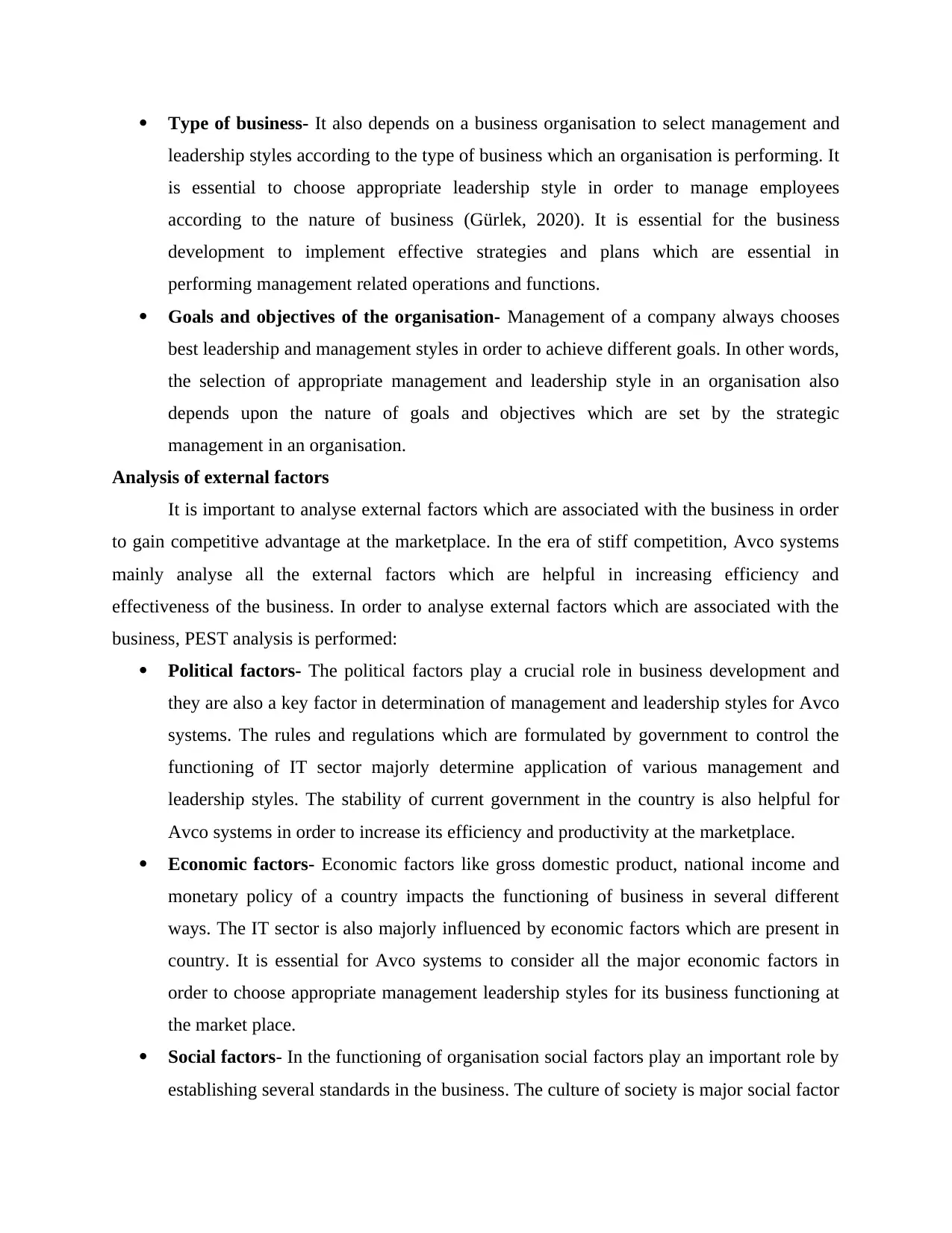
Type of business- It also depends on a business organisation to select management and
leadership styles according to the type of business which an organisation is performing. It
is essential to choose appropriate leadership style in order to manage employees
according to the nature of business (Gürlek, 2020). It is essential for the business
development to implement effective strategies and plans which are essential in
performing management related operations and functions.
Goals and objectives of the organisation- Management of a company always chooses
best leadership and management styles in order to achieve different goals. In other words,
the selection of appropriate management and leadership style in an organisation also
depends upon the nature of goals and objectives which are set by the strategic
management in an organisation.
Analysis of external factors
It is important to analyse external factors which are associated with the business in order
to gain competitive advantage at the marketplace. In the era of stiff competition, Avco systems
mainly analyse all the external factors which are helpful in increasing efficiency and
effectiveness of the business. In order to analyse external factors which are associated with the
business, PEST analysis is performed:
Political factors- The political factors play a crucial role in business development and
they are also a key factor in determination of management and leadership styles for Avco
systems. The rules and regulations which are formulated by government to control the
functioning of IT sector majorly determine application of various management and
leadership styles. The stability of current government in the country is also helpful for
Avco systems in order to increase its efficiency and productivity at the marketplace.
Economic factors- Economic factors like gross domestic product, national income and
monetary policy of a country impacts the functioning of business in several different
ways. The IT sector is also majorly influenced by economic factors which are present in
country. It is essential for Avco systems to consider all the major economic factors in
order to choose appropriate management leadership styles for its business functioning at
the market place.
Social factors- In the functioning of organisation social factors play an important role by
establishing several standards in the business. The culture of society is major social factor
leadership styles according to the type of business which an organisation is performing. It
is essential to choose appropriate leadership style in order to manage employees
according to the nature of business (Gürlek, 2020). It is essential for the business
development to implement effective strategies and plans which are essential in
performing management related operations and functions.
Goals and objectives of the organisation- Management of a company always chooses
best leadership and management styles in order to achieve different goals. In other words,
the selection of appropriate management and leadership style in an organisation also
depends upon the nature of goals and objectives which are set by the strategic
management in an organisation.
Analysis of external factors
It is important to analyse external factors which are associated with the business in order
to gain competitive advantage at the marketplace. In the era of stiff competition, Avco systems
mainly analyse all the external factors which are helpful in increasing efficiency and
effectiveness of the business. In order to analyse external factors which are associated with the
business, PEST analysis is performed:
Political factors- The political factors play a crucial role in business development and
they are also a key factor in determination of management and leadership styles for Avco
systems. The rules and regulations which are formulated by government to control the
functioning of IT sector majorly determine application of various management and
leadership styles. The stability of current government in the country is also helpful for
Avco systems in order to increase its efficiency and productivity at the marketplace.
Economic factors- Economic factors like gross domestic product, national income and
monetary policy of a country impacts the functioning of business in several different
ways. The IT sector is also majorly influenced by economic factors which are present in
country. It is essential for Avco systems to consider all the major economic factors in
order to choose appropriate management leadership styles for its business functioning at
the market place.
Social factors- In the functioning of organisation social factors play an important role by
establishing several standards in the business. The culture of society is major social factor
⊘ This is a preview!⊘
Do you want full access?
Subscribe today to unlock all pages.

Trusted by 1+ million students worldwide
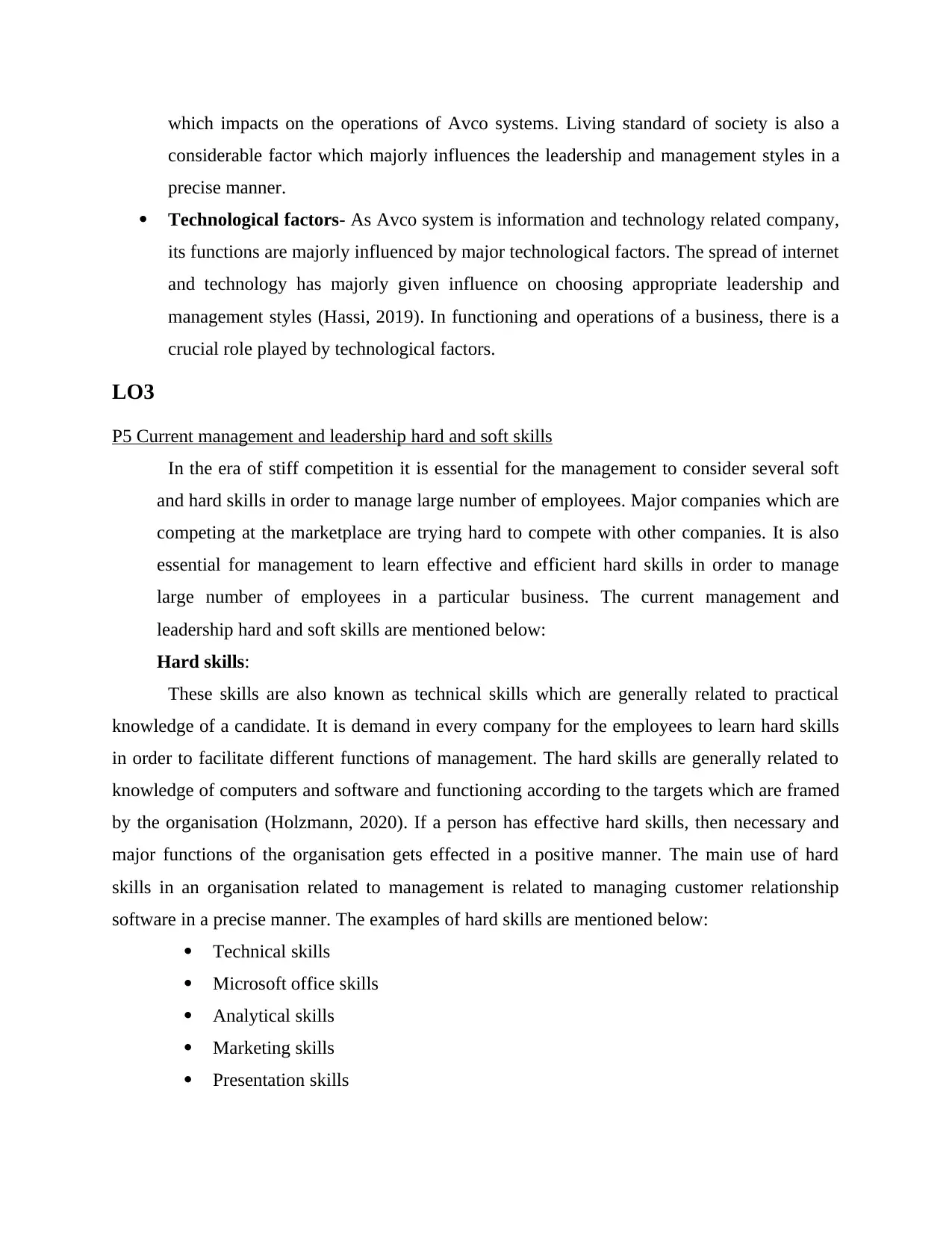
which impacts on the operations of Avco systems. Living standard of society is also a
considerable factor which majorly influences the leadership and management styles in a
precise manner.
Technological factors- As Avco system is information and technology related company,
its functions are majorly influenced by major technological factors. The spread of internet
and technology has majorly given influence on choosing appropriate leadership and
management styles (Hassi, 2019). In functioning and operations of a business, there is a
crucial role played by technological factors.
LO3
P5 Current management and leadership hard and soft skills
In the era of stiff competition it is essential for the management to consider several soft
and hard skills in order to manage large number of employees. Major companies which are
competing at the marketplace are trying hard to compete with other companies. It is also
essential for management to learn effective and efficient hard skills in order to manage
large number of employees in a particular business. The current management and
leadership hard and soft skills are mentioned below:
Hard skills:
These skills are also known as technical skills which are generally related to practical
knowledge of a candidate. It is demand in every company for the employees to learn hard skills
in order to facilitate different functions of management. The hard skills are generally related to
knowledge of computers and software and functioning according to the targets which are framed
by the organisation (Holzmann, 2020). If a person has effective hard skills, then necessary and
major functions of the organisation gets effected in a positive manner. The main use of hard
skills in an organisation related to management is related to managing customer relationship
software in a precise manner. The examples of hard skills are mentioned below:
Technical skills
Microsoft office skills
Analytical skills
Marketing skills
Presentation skills
considerable factor which majorly influences the leadership and management styles in a
precise manner.
Technological factors- As Avco system is information and technology related company,
its functions are majorly influenced by major technological factors. The spread of internet
and technology has majorly given influence on choosing appropriate leadership and
management styles (Hassi, 2019). In functioning and operations of a business, there is a
crucial role played by technological factors.
LO3
P5 Current management and leadership hard and soft skills
In the era of stiff competition it is essential for the management to consider several soft
and hard skills in order to manage large number of employees. Major companies which are
competing at the marketplace are trying hard to compete with other companies. It is also
essential for management to learn effective and efficient hard skills in order to manage
large number of employees in a particular business. The current management and
leadership hard and soft skills are mentioned below:
Hard skills:
These skills are also known as technical skills which are generally related to practical
knowledge of a candidate. It is demand in every company for the employees to learn hard skills
in order to facilitate different functions of management. The hard skills are generally related to
knowledge of computers and software and functioning according to the targets which are framed
by the organisation (Holzmann, 2020). If a person has effective hard skills, then necessary and
major functions of the organisation gets effected in a positive manner. The main use of hard
skills in an organisation related to management is related to managing customer relationship
software in a precise manner. The examples of hard skills are mentioned below:
Technical skills
Microsoft office skills
Analytical skills
Marketing skills
Presentation skills
Paraphrase This Document
Need a fresh take? Get an instant paraphrase of this document with our AI Paraphraser
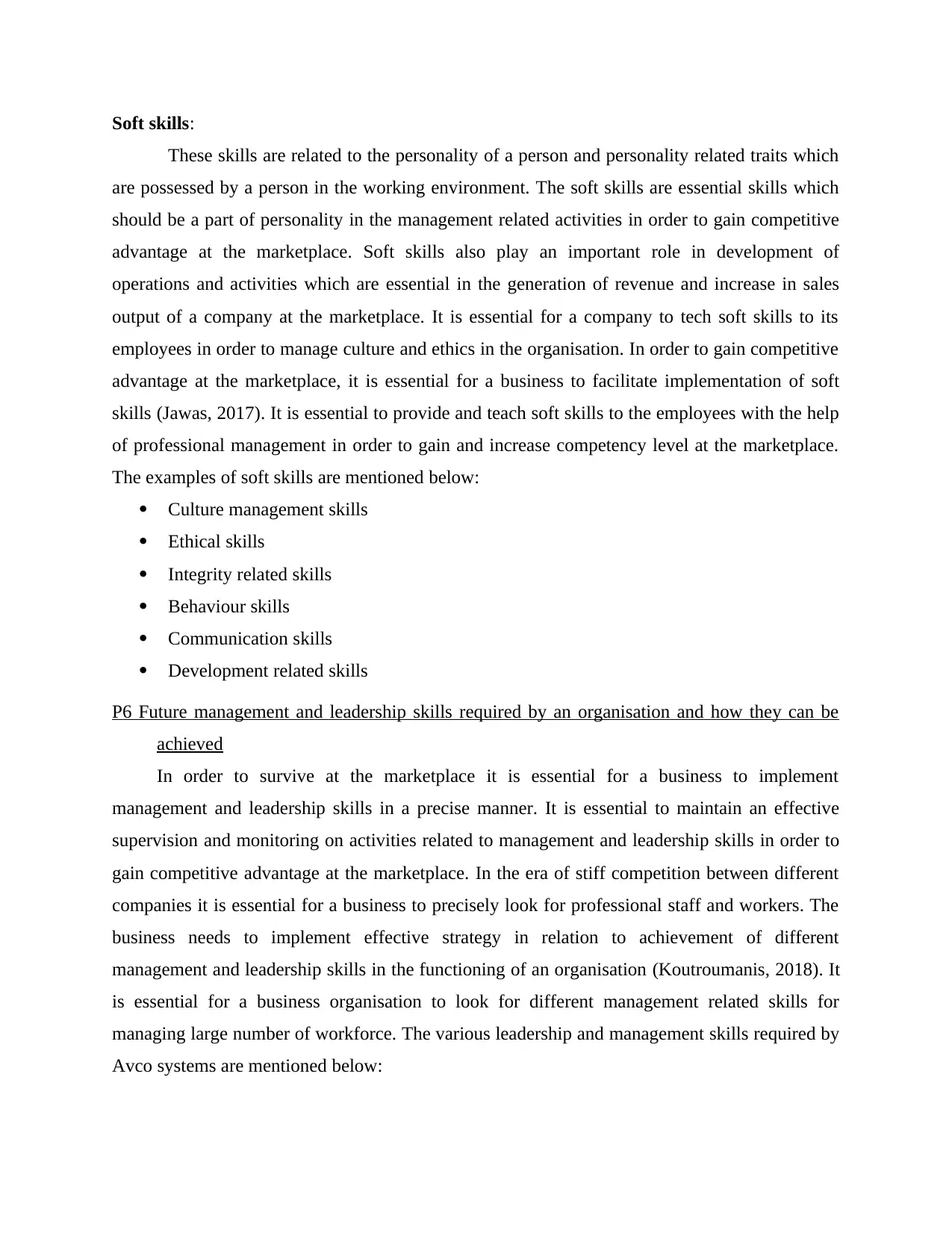
Soft skills:
These skills are related to the personality of a person and personality related traits which
are possessed by a person in the working environment. The soft skills are essential skills which
should be a part of personality in the management related activities in order to gain competitive
advantage at the marketplace. Soft skills also play an important role in development of
operations and activities which are essential in the generation of revenue and increase in sales
output of a company at the marketplace. It is essential for a company to tech soft skills to its
employees in order to manage culture and ethics in the organisation. In order to gain competitive
advantage at the marketplace, it is essential for a business to facilitate implementation of soft
skills (Jawas, 2017). It is essential to provide and teach soft skills to the employees with the help
of professional management in order to gain and increase competency level at the marketplace.
The examples of soft skills are mentioned below:
Culture management skills
Ethical skills
Integrity related skills
Behaviour skills
Communication skills
Development related skills
P6 Future management and leadership skills required by an organisation and how they can be
achieved
In order to survive at the marketplace it is essential for a business to implement
management and leadership skills in a precise manner. It is essential to maintain an effective
supervision and monitoring on activities related to management and leadership skills in order to
gain competitive advantage at the marketplace. In the era of stiff competition between different
companies it is essential for a business to precisely look for professional staff and workers. The
business needs to implement effective strategy in relation to achievement of different
management and leadership skills in the functioning of an organisation (Koutroumanis, 2018). It
is essential for a business organisation to look for different management related skills for
managing large number of workforce. The various leadership and management skills required by
Avco systems are mentioned below:
These skills are related to the personality of a person and personality related traits which
are possessed by a person in the working environment. The soft skills are essential skills which
should be a part of personality in the management related activities in order to gain competitive
advantage at the marketplace. Soft skills also play an important role in development of
operations and activities which are essential in the generation of revenue and increase in sales
output of a company at the marketplace. It is essential for a company to tech soft skills to its
employees in order to manage culture and ethics in the organisation. In order to gain competitive
advantage at the marketplace, it is essential for a business to facilitate implementation of soft
skills (Jawas, 2017). It is essential to provide and teach soft skills to the employees with the help
of professional management in order to gain and increase competency level at the marketplace.
The examples of soft skills are mentioned below:
Culture management skills
Ethical skills
Integrity related skills
Behaviour skills
Communication skills
Development related skills
P6 Future management and leadership skills required by an organisation and how they can be
achieved
In order to survive at the marketplace it is essential for a business to implement
management and leadership skills in a precise manner. It is essential to maintain an effective
supervision and monitoring on activities related to management and leadership skills in order to
gain competitive advantage at the marketplace. In the era of stiff competition between different
companies it is essential for a business to precisely look for professional staff and workers. The
business needs to implement effective strategy in relation to achievement of different
management and leadership skills in the functioning of an organisation (Koutroumanis, 2018). It
is essential for a business organisation to look for different management related skills for
managing large number of workforce. The various leadership and management skills required by
Avco systems are mentioned below:
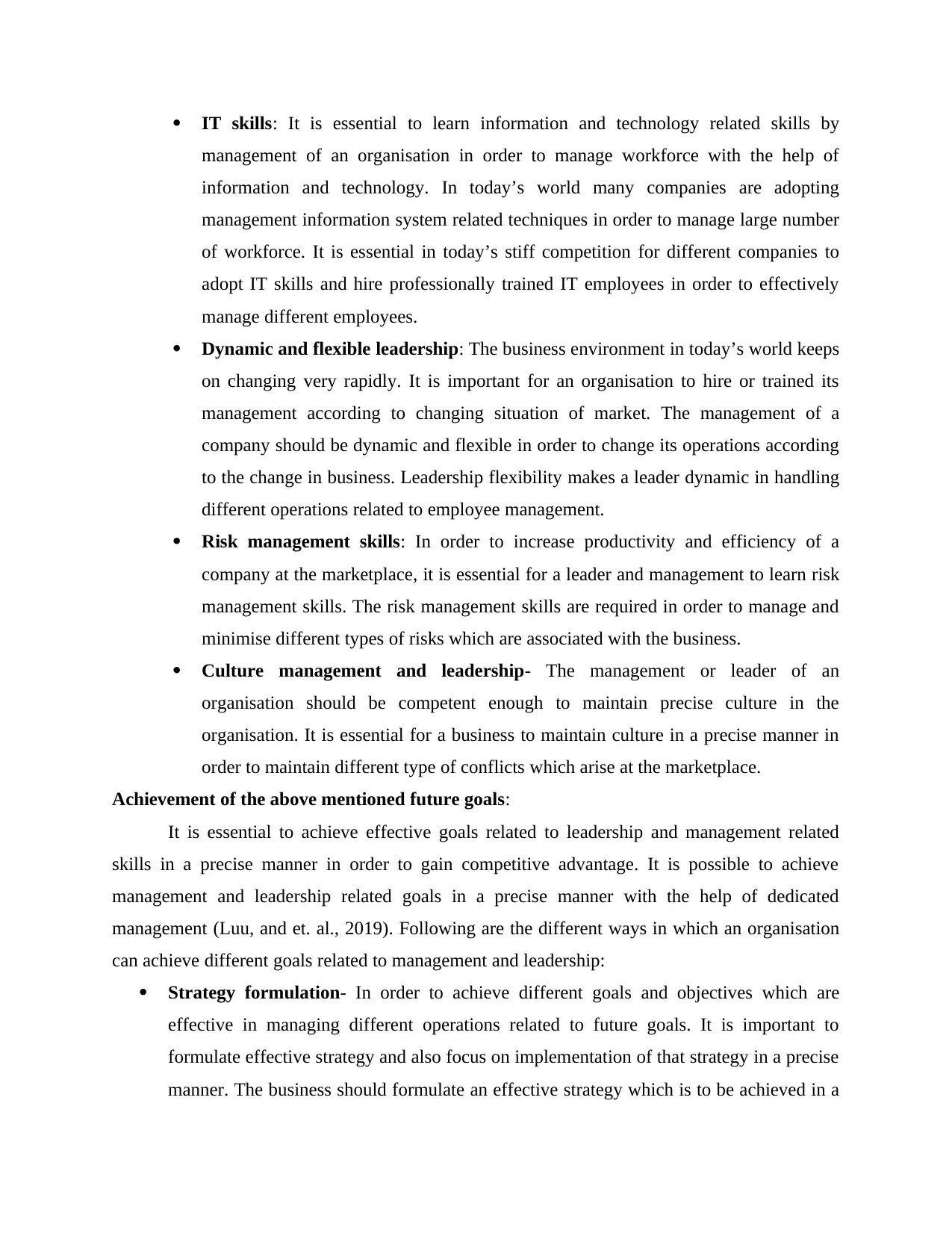
IT skills: It is essential to learn information and technology related skills by
management of an organisation in order to manage workforce with the help of
information and technology. In today’s world many companies are adopting
management information system related techniques in order to manage large number
of workforce. It is essential in today’s stiff competition for different companies to
adopt IT skills and hire professionally trained IT employees in order to effectively
manage different employees.
Dynamic and flexible leadership: The business environment in today’s world keeps
on changing very rapidly. It is important for an organisation to hire or trained its
management according to changing situation of market. The management of a
company should be dynamic and flexible in order to change its operations according
to the change in business. Leadership flexibility makes a leader dynamic in handling
different operations related to employee management.
Risk management skills: In order to increase productivity and efficiency of a
company at the marketplace, it is essential for a leader and management to learn risk
management skills. The risk management skills are required in order to manage and
minimise different types of risks which are associated with the business.
Culture management and leadership- The management or leader of an
organisation should be competent enough to maintain precise culture in the
organisation. It is essential for a business to maintain culture in a precise manner in
order to maintain different type of conflicts which arise at the marketplace.
Achievement of the above mentioned future goals:
It is essential to achieve effective goals related to leadership and management related
skills in a precise manner in order to gain competitive advantage. It is possible to achieve
management and leadership related goals in a precise manner with the help of dedicated
management (Luu, and et. al., 2019). Following are the different ways in which an organisation
can achieve different goals related to management and leadership:
Strategy formulation- In order to achieve different goals and objectives which are
effective in managing different operations related to future goals. It is important to
formulate effective strategy and also focus on implementation of that strategy in a precise
manner. The business should formulate an effective strategy which is to be achieved in a
management of an organisation in order to manage workforce with the help of
information and technology. In today’s world many companies are adopting
management information system related techniques in order to manage large number
of workforce. It is essential in today’s stiff competition for different companies to
adopt IT skills and hire professionally trained IT employees in order to effectively
manage different employees.
Dynamic and flexible leadership: The business environment in today’s world keeps
on changing very rapidly. It is important for an organisation to hire or trained its
management according to changing situation of market. The management of a
company should be dynamic and flexible in order to change its operations according
to the change in business. Leadership flexibility makes a leader dynamic in handling
different operations related to employee management.
Risk management skills: In order to increase productivity and efficiency of a
company at the marketplace, it is essential for a leader and management to learn risk
management skills. The risk management skills are required in order to manage and
minimise different types of risks which are associated with the business.
Culture management and leadership- The management or leader of an
organisation should be competent enough to maintain precise culture in the
organisation. It is essential for a business to maintain culture in a precise manner in
order to maintain different type of conflicts which arise at the marketplace.
Achievement of the above mentioned future goals:
It is essential to achieve effective goals related to leadership and management related
skills in a precise manner in order to gain competitive advantage. It is possible to achieve
management and leadership related goals in a precise manner with the help of dedicated
management (Luu, and et. al., 2019). Following are the different ways in which an organisation
can achieve different goals related to management and leadership:
Strategy formulation- In order to achieve different goals and objectives which are
effective in managing different operations related to future goals. It is important to
formulate effective strategy and also focus on implementation of that strategy in a precise
manner. The business should formulate an effective strategy which is to be achieved in a
⊘ This is a preview!⊘
Do you want full access?
Subscribe today to unlock all pages.

Trusted by 1+ million students worldwide
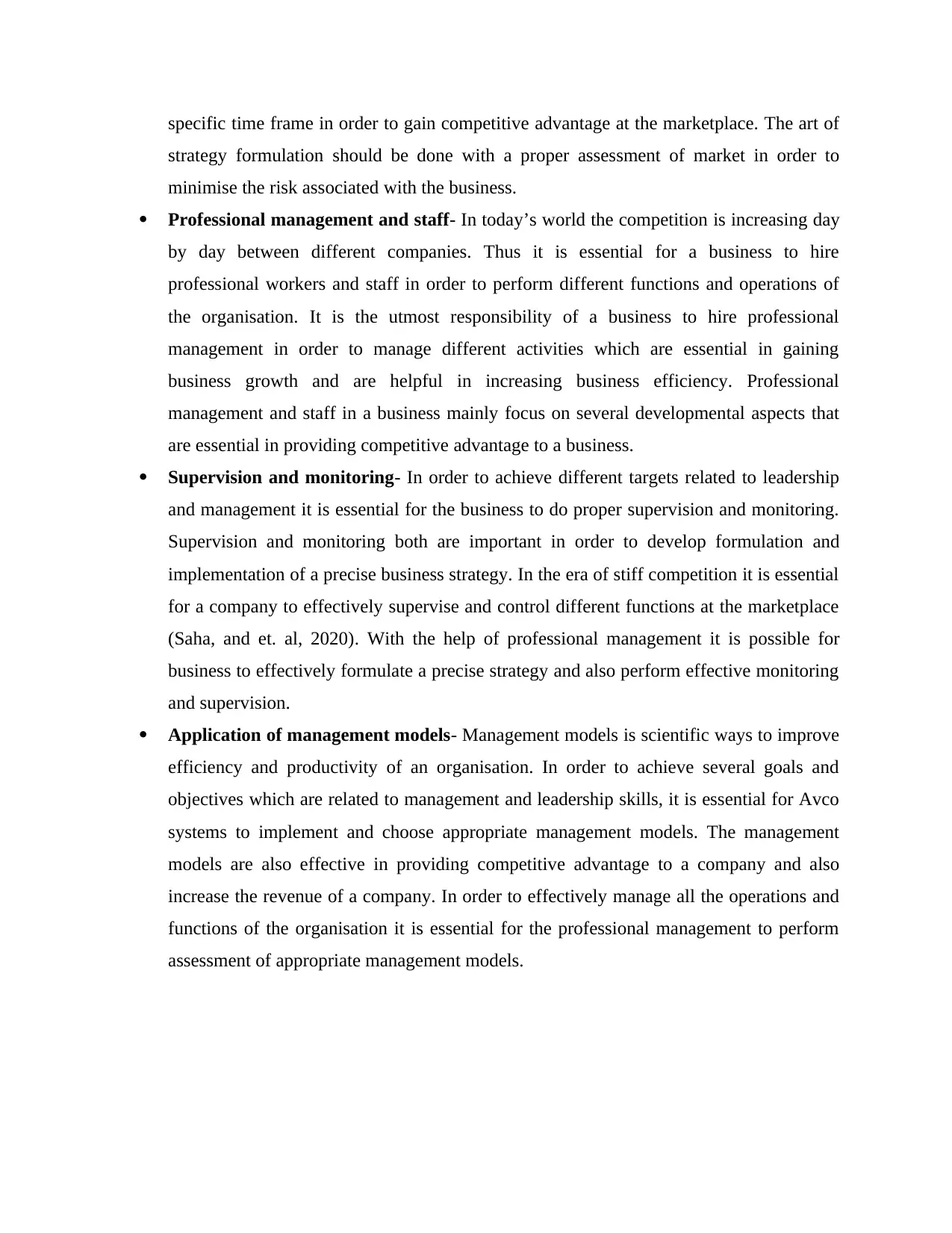
specific time frame in order to gain competitive advantage at the marketplace. The art of
strategy formulation should be done with a proper assessment of market in order to
minimise the risk associated with the business.
Professional management and staff- In today’s world the competition is increasing day
by day between different companies. Thus it is essential for a business to hire
professional workers and staff in order to perform different functions and operations of
the organisation. It is the utmost responsibility of a business to hire professional
management in order to manage different activities which are essential in gaining
business growth and are helpful in increasing business efficiency. Professional
management and staff in a business mainly focus on several developmental aspects that
are essential in providing competitive advantage to a business.
Supervision and monitoring- In order to achieve different targets related to leadership
and management it is essential for the business to do proper supervision and monitoring.
Supervision and monitoring both are important in order to develop formulation and
implementation of a precise business strategy. In the era of stiff competition it is essential
for a company to effectively supervise and control different functions at the marketplace
(Saha, and et. al, 2020). With the help of professional management it is possible for
business to effectively formulate a precise strategy and also perform effective monitoring
and supervision.
Application of management models- Management models is scientific ways to improve
efficiency and productivity of an organisation. In order to achieve several goals and
objectives which are related to management and leadership skills, it is essential for Avco
systems to implement and choose appropriate management models. The management
models are also effective in providing competitive advantage to a company and also
increase the revenue of a company. In order to effectively manage all the operations and
functions of the organisation it is essential for the professional management to perform
assessment of appropriate management models.
strategy formulation should be done with a proper assessment of market in order to
minimise the risk associated with the business.
Professional management and staff- In today’s world the competition is increasing day
by day between different companies. Thus it is essential for a business to hire
professional workers and staff in order to perform different functions and operations of
the organisation. It is the utmost responsibility of a business to hire professional
management in order to manage different activities which are essential in gaining
business growth and are helpful in increasing business efficiency. Professional
management and staff in a business mainly focus on several developmental aspects that
are essential in providing competitive advantage to a business.
Supervision and monitoring- In order to achieve different targets related to leadership
and management it is essential for the business to do proper supervision and monitoring.
Supervision and monitoring both are important in order to develop formulation and
implementation of a precise business strategy. In the era of stiff competition it is essential
for a company to effectively supervise and control different functions at the marketplace
(Saha, and et. al, 2020). With the help of professional management it is possible for
business to effectively formulate a precise strategy and also perform effective monitoring
and supervision.
Application of management models- Management models is scientific ways to improve
efficiency and productivity of an organisation. In order to achieve several goals and
objectives which are related to management and leadership skills, it is essential for Avco
systems to implement and choose appropriate management models. The management
models are also effective in providing competitive advantage to a company and also
increase the revenue of a company. In order to effectively manage all the operations and
functions of the organisation it is essential for the professional management to perform
assessment of appropriate management models.
Paraphrase This Document
Need a fresh take? Get an instant paraphrase of this document with our AI Paraphraser
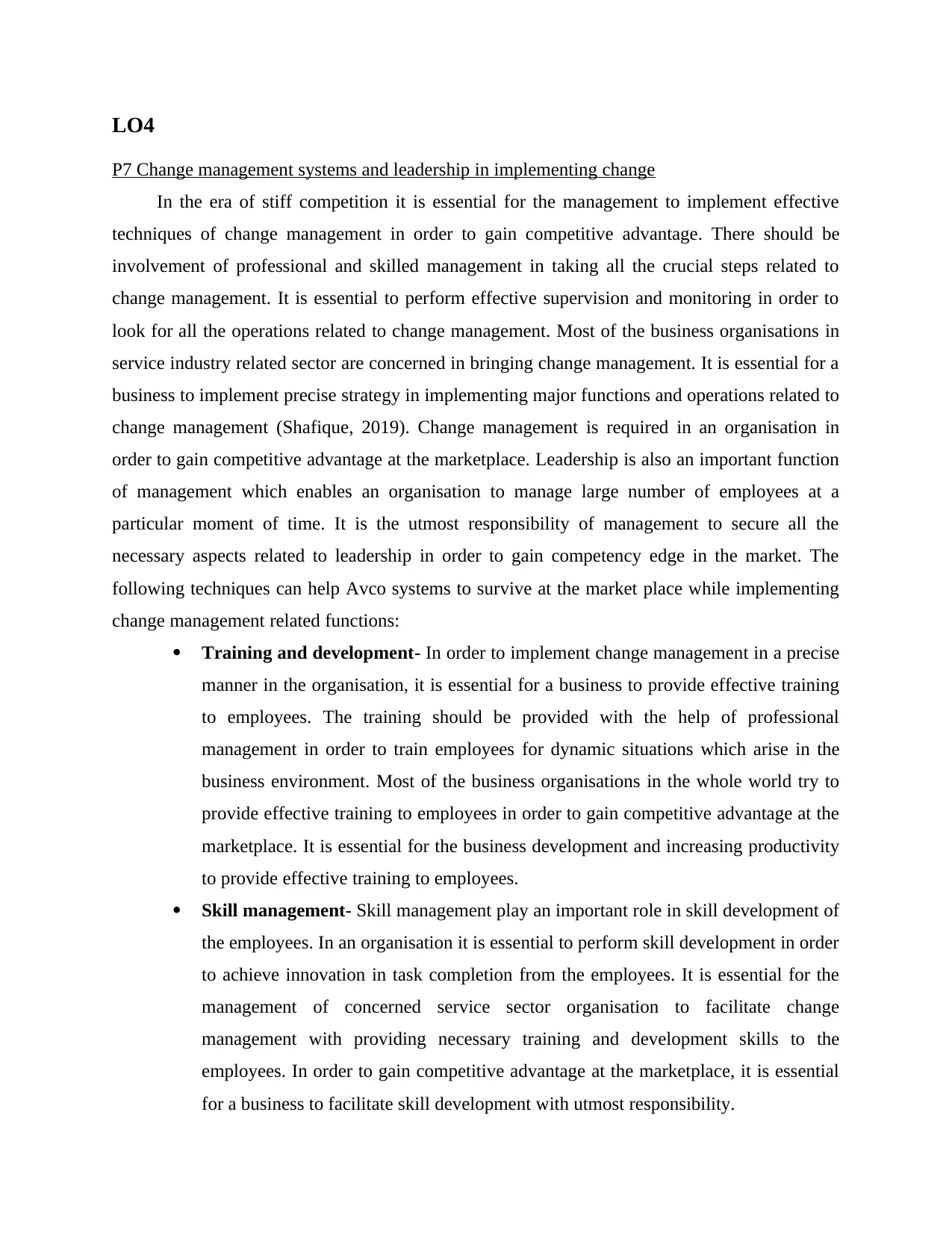
LO4
P7 Change management systems and leadership in implementing change
In the era of stiff competition it is essential for the management to implement effective
techniques of change management in order to gain competitive advantage. There should be
involvement of professional and skilled management in taking all the crucial steps related to
change management. It is essential to perform effective supervision and monitoring in order to
look for all the operations related to change management. Most of the business organisations in
service industry related sector are concerned in bringing change management. It is essential for a
business to implement precise strategy in implementing major functions and operations related to
change management (Shafique, 2019). Change management is required in an organisation in
order to gain competitive advantage at the marketplace. Leadership is also an important function
of management which enables an organisation to manage large number of employees at a
particular moment of time. It is the utmost responsibility of management to secure all the
necessary aspects related to leadership in order to gain competency edge in the market. The
following techniques can help Avco systems to survive at the market place while implementing
change management related functions:
Training and development- In order to implement change management in a precise
manner in the organisation, it is essential for a business to provide effective training
to employees. The training should be provided with the help of professional
management in order to train employees for dynamic situations which arise in the
business environment. Most of the business organisations in the whole world try to
provide effective training to employees in order to gain competitive advantage at the
marketplace. It is essential for the business development and increasing productivity
to provide effective training to employees.
Skill management- Skill management play an important role in skill development of
the employees. In an organisation it is essential to perform skill development in order
to achieve innovation in task completion from the employees. It is essential for the
management of concerned service sector organisation to facilitate change
management with providing necessary training and development skills to the
employees. In order to gain competitive advantage at the marketplace, it is essential
for a business to facilitate skill development with utmost responsibility.
P7 Change management systems and leadership in implementing change
In the era of stiff competition it is essential for the management to implement effective
techniques of change management in order to gain competitive advantage. There should be
involvement of professional and skilled management in taking all the crucial steps related to
change management. It is essential to perform effective supervision and monitoring in order to
look for all the operations related to change management. Most of the business organisations in
service industry related sector are concerned in bringing change management. It is essential for a
business to implement precise strategy in implementing major functions and operations related to
change management (Shafique, 2019). Change management is required in an organisation in
order to gain competitive advantage at the marketplace. Leadership is also an important function
of management which enables an organisation to manage large number of employees at a
particular moment of time. It is the utmost responsibility of management to secure all the
necessary aspects related to leadership in order to gain competency edge in the market. The
following techniques can help Avco systems to survive at the market place while implementing
change management related functions:
Training and development- In order to implement change management in a precise
manner in the organisation, it is essential for a business to provide effective training
to employees. The training should be provided with the help of professional
management in order to train employees for dynamic situations which arise in the
business environment. Most of the business organisations in the whole world try to
provide effective training to employees in order to gain competitive advantage at the
marketplace. It is essential for the business development and increasing productivity
to provide effective training to employees.
Skill management- Skill management play an important role in skill development of
the employees. In an organisation it is essential to perform skill development in order
to achieve innovation in task completion from the employees. It is essential for the
management of concerned service sector organisation to facilitate change
management with providing necessary training and development skills to the
employees. In order to gain competitive advantage at the marketplace, it is essential
for a business to facilitate skill development with utmost responsibility.
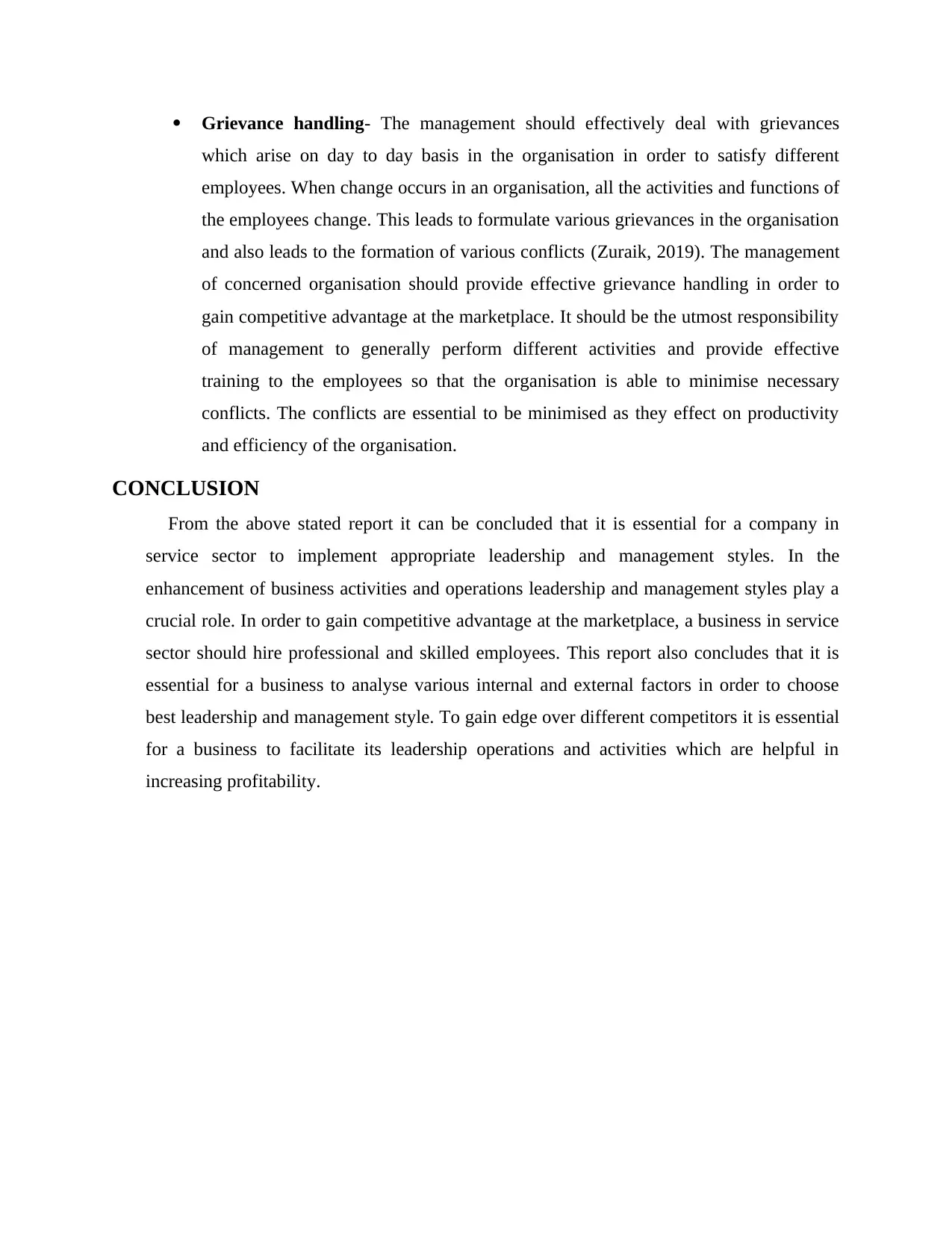
Grievance handling- The management should effectively deal with grievances
which arise on day to day basis in the organisation in order to satisfy different
employees. When change occurs in an organisation, all the activities and functions of
the employees change. This leads to formulate various grievances in the organisation
and also leads to the formation of various conflicts (Zuraik, 2019). The management
of concerned organisation should provide effective grievance handling in order to
gain competitive advantage at the marketplace. It should be the utmost responsibility
of management to generally perform different activities and provide effective
training to the employees so that the organisation is able to minimise necessary
conflicts. The conflicts are essential to be minimised as they effect on productivity
and efficiency of the organisation.
CONCLUSION
From the above stated report it can be concluded that it is essential for a company in
service sector to implement appropriate leadership and management styles. In the
enhancement of business activities and operations leadership and management styles play a
crucial role. In order to gain competitive advantage at the marketplace, a business in service
sector should hire professional and skilled employees. This report also concludes that it is
essential for a business to analyse various internal and external factors in order to choose
best leadership and management style. To gain edge over different competitors it is essential
for a business to facilitate its leadership operations and activities which are helpful in
increasing profitability.
which arise on day to day basis in the organisation in order to satisfy different
employees. When change occurs in an organisation, all the activities and functions of
the employees change. This leads to formulate various grievances in the organisation
and also leads to the formation of various conflicts (Zuraik, 2019). The management
of concerned organisation should provide effective grievance handling in order to
gain competitive advantage at the marketplace. It should be the utmost responsibility
of management to generally perform different activities and provide effective
training to the employees so that the organisation is able to minimise necessary
conflicts. The conflicts are essential to be minimised as they effect on productivity
and efficiency of the organisation.
CONCLUSION
From the above stated report it can be concluded that it is essential for a company in
service sector to implement appropriate leadership and management styles. In the
enhancement of business activities and operations leadership and management styles play a
crucial role. In order to gain competitive advantage at the marketplace, a business in service
sector should hire professional and skilled employees. This report also concludes that it is
essential for a business to analyse various internal and external factors in order to choose
best leadership and management style. To gain edge over different competitors it is essential
for a business to facilitate its leadership operations and activities which are helpful in
increasing profitability.
⊘ This is a preview!⊘
Do you want full access?
Subscribe today to unlock all pages.

Trusted by 1+ million students worldwide
1 out of 13
Related Documents
Your All-in-One AI-Powered Toolkit for Academic Success.
+13062052269
info@desklib.com
Available 24*7 on WhatsApp / Email
![[object Object]](/_next/static/media/star-bottom.7253800d.svg)
Unlock your academic potential
Copyright © 2020–2026 A2Z Services. All Rights Reserved. Developed and managed by ZUCOL.





